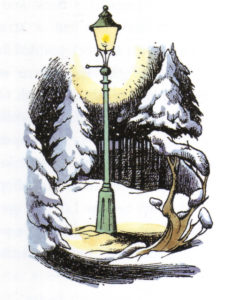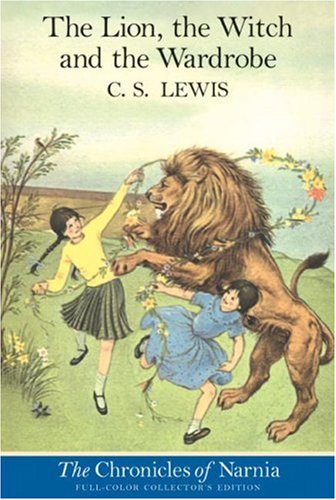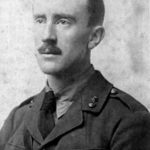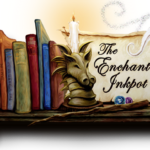Speculative Faith Reading Group 1: Entering The ‘Wardrobe’
This site began in reality. Our readers enjoy Christian speculative stories and want to talk about them. That’s developed into what is, for our readers, mostly online-only discussion. On other sites, people seem to assume we already know why we love these stories, and have moved on to over-limited conversation about Speculative Writing Tips and Tricks.
 With this series I want to pull back a bit. Go back to basics. Back to the simple fantasies that most of us discovered, as children or children at heart. Back to the over-discussed but still vital role of C.S. Lewis. Back to Narnia. And of course, back to the famous Wardrobe.
With this series I want to pull back a bit. Go back to basics. Back to the simple fantasies that most of us discovered, as children or children at heart. Back to the over-discussed but still vital role of C.S. Lewis. Back to Narnia. And of course, back to the famous Wardrobe.
I hope to do this over the summer, in this new eight- to nine-part series. And unlike other series, this one, in this world, will correspond roughly to the passage of time in my world.
At my church, I’m hosting the first (to my knowledge) Speculative Faith Reading Group.
You may have heard what to avoid in stories. But how can we discern and enjoy fantasy novels to the glory of our own Author?
Anyone who loves to read and discuss stories is welcome to join this new Speculative Faith Reading Group. It begins at this church (in Lexington, Ky.) this Saturday, June 2, at 3:30 pm.
This class will actually be nine weeks long, until July 28. All group sessions will be based on “The Lion, the Witch and the Wardrobe” by C.S. Lewis. We’ll enjoy reading two chapters of the classic fantasy per week. (If absolutely necessary, you can recall it from memory, but reading along is strongly encouraged.) We’ll also discuss how Christians can discern and enjoy stories for God’s glory.
Though I wish all Speculative Faith readers could join us, you’ll likely not be able to attend reading-group sessions. That’s all right. My plan for this series is to post each series of class notes two days in advance of that Saturday, every Thursday. Inside: snippets of thoughts, discussion-starters, questions, perhaps excerpts from the books themselves to read aloud.
Thus, if Aslan is with us, this virtual reading group will somewhat parallel the real-world reading group. One can inform the other. And each set will, perhaps, be able to interact.
Before each set of notes, I may summarize the real-world discussion of the previous week.
I hope you enjoy it. Yet I also need something from readers — your intense prayers. This is an activity I’ve hoped to arrange for a long time, and now more than ever I recall that these stories aren’t simply about moral entertainment. We’re discussing worship. New ways to enjoy God, new “songs” to “sing” for Him, or new understandings of old “songs.” We’re also aiming for truly Biblical enjoyment and discernment, versus “it’s just entertainment” or “if it even appears to be bad, avoid it” notions that are hidden deep inside all of us. And our own sin-shrapnel, jabbed by the Devil, surely rebels against Taking Things So Seriously.
Yet as Lewis himself wrote, in The Last Battle: “There is a kind of happiness and wonder that makes you serious.” And in this “seriousness,” based on the worship of God, is true joy.
Now, as the old read-along cassettes (after the chimes rang!) used to say, “Let’s begin now.”
Class 1: Lucy Looks Into a Wardrobe / What Lucy Found There
 Opening discussion
Opening discussion
- First question: Why are we here? What are your hopes for this reading group?
- Second big question: Why should we read stories anyway?
- Summary of the Beauty and Truth series’ mention of the possibly greatest challenge to enjoying stories. Don’t we have better things to do? Aren’t Christians supposed to do missionary work and proclaim the Gospel, not sit around enjoying fun fiction?
- The Gospel is greater than only “we get saved to get other people saved.” It touches on every life area, including what we eat, how we work, how we spend our time.
- All that we do should be worship. (Romans 12: 1-2; Col. 3:23.)
- God isn’t only silent on stories. He shows and tells why stories uniquely honor Him.
- Third big question: What is the purpose of story?
- How would you answer? Some would say “To be entertained.” Or “To spend time if there’s nothing else to do.” Or “To teach good morals in a memorable way.” Some Christians also say, while noting apparent legalism of others who seem to shun all fiction (or secular fiction), “We read stories to understand and engage our culture.”
- All these are good reasons, but not the reason to enjoy a story.
- The Westminster Shorter Catechism says:
Q. What is the chief end of man?
A. Man’s chief end is to glorify God, and to enjoy Him forever. - Man is not the only being who gives glory to God. Nature honors Him (the Psalms). Even fallen creation points to Him, enough to make people guilty and “without excuse” for ignoring it, even if they haven’t read the Bible (Romans 1). Creative art honors Him (Exodus 31-28). Even unsaved people, by punishing evil (Romans 11) or giving good gifts to their children (Matt. 7:11) show God’s common grace.
- With this in mind, we can say about stories:
Story’s chief end is to glorify God, and to help us enjoy Him forever.
- So story is not only to entertain, or to be moral, but to reflect God. More evidence:
- The Gospel is first and foremost a Story. It is supported by truthful statements (often analyzed by books of doctrine and theology). It tells how Christ begins His Gospel (the Hero and plot or quest), to fight and/or redeem His enemies (supporting characters and villains) in a fantastic world (our reality). (More on this, later.)
- Throughout the Epic Story’s “smaller” stories — Moses, King David, Daniel, etc. — we see God approving the creative works of man. God inspired whole collections of literature that aren’t “systematic,” but weave works of truth and beauty.
- Of course, Jesus told parables, stories about His Kingdom. He told different kinds of stories, not only allegories, and not only about how to practice good behavior.
- We’ll discuss this more in coming weeks. But enough telling. Let’s experience it.
Stepping into the Wardrobe
- How did you first read The Lion, the Witch and the Wardrobe? Or is this your first time?
- If you have read it before, what were your impressions then?
- By contrast, how and why do you like the book now? How have your experiences (in real life or with other stories) changed your views?
- In your view, what kind of story is this? a) allegory, b) child’s fantasy, c) morality tale, d) memorable reminder of the Gospel? (Answer: all of the above?)
- To know, we’d need to understand the author — just as we should do with the Bible. Otherwise, we may be reading the story in a way that he didn’t mean it to be read. So as we read, we’ll also discuss C.S. Lewis and what he has said about his intentions — and what he might not have said, but which seems clear and consistent with his worldview.
- A definition to keep in mind: Christian speculative stories are fantastic tales that are written, or otherwise shown, clearly yet naturally from a Christian worldview.
- The hero and plot reflects Christ and the Gospel.
- Characters reflect real people.
- The story-world and style reflect reality and God’s truth, beauties, and creativity.
- The author is a Christian and isn’t ignoring that for his story. (Non-Christian authors may write stories that include Christian truth, but by “accident,” as common grace.)
Chapter 1: Lucy Looks Into a Wardrobe

(Break to read excerpts from the first chapter.)
- Leaving out for the moment what the movie helped fill in — much of which was helpful — do you know the historical setting? Lewis barely mentions it. How come? How do we apply the same methods we use to read the Bible (keeping in mind its original audience and seeking the author’s intent) helpful as we picture what Lewis does and doesn’t say?
- Some people have said the four Pevensies of LWW are shallow. (They’re not trying to be critical, because they also praise the later Chronicles as having better characters.) Even if true, is that bad? Do good books maybe start “slow” and help us grow into them?
- Page 4: What do we first hear the children say? What do they say about them? Which child do you like or identify with most? (Note also the animals they mention on page 5.)
- Do you think Lewis did this by design? It helps to know that by this time, Lewis had already written a lot of fiction, such as the Ransom Trilogy of high fantasy/science fiction for adults. He knew how to write characters well and use dialogue to show what people are like. So it’s not like he didn’t know how to do this, and only learned later.
- How do you feel when you go “exploring” with the Pevensie children? Do you remember your own childhood, exploring someplace new, maybe even an old house? How can these enjoyment of that real experience and this story’s experience, glorify God?
- Here Lewis incidentally shows us what any good book does: invites us to explore a new world. But note how Peter says “Nothing there!” (p. 6) and leads them off. How might this remind us how we think of “ordinary” things like an old wardrobe in a spare room? Or like books that people think are “just stories,” but have fantastic wonders inside?
- How do you feel, going along with Lucy into the wardrobe? How does the author, without saying what’s inside (and even though we already know!) heighten our anticipation for what fantastic place lies beyond? How does this feeling honor God?
- For later: how do you feel about imagining “magic” that is not only in Narnia, but extends into “our” world to find the children? Is this really our world?
(Note as of Sunday, June 3: A previous version of this column went on to include discussion questions for Chapter 2, “What Lucy Found There.” Because in the group we actually ended discussion before exploring that chapter, I’ve since removed those questions. Next week’s column will offer an expanded version of them.)









































Oh, I wish I could attend. Prayers and thoughts be with you during this.
Pretty cool. You could publish this as a resource for churches, youth groups, etc.
Agreed. I wish I could do something like this at my church.
That’s the reason I’m posting the notes here — to encourage similar efforts. When this class is done, I’ll hone the results and perhaps have a full-fledge curriculum.
Oh, please, yes!! Give us a lesson plan!! I’d love to bring something like this into my writer’s group.
Sticking out my lower lip and pouting. I wish I could go!!!! 🙁
[…] give discussion questions regarding the first book to the group and discuss them. He has part one here. I’ll post each session as they become available. It looks very interesting and might be a […]
This sounds excellent! Wish I could go. I would be very interested in a lesson plan for discussion groups. This series made a huge impact on my life from the first time I read them at age 8, and I love introducing children to the wonders of Narnia. I long ago lost track of how many times I’ve read through the series–usually aloud.
[…] you like, catch up on my chapter 1 discussion notes. And if you weren’t able to attend yourself, here are some quick observations. I hope they, along […]
Although I believe I read the entire Chronicles through twice, first when I was about 12 or 13, I don’t think I ever understood them very well. I’m just now joining in this digital version of the reading group, because I didn’t have a personal copy of the books. I’ve since ordered and received one, and now I’m grateful and excited to participate. 🙂
I liked it, but I didn’t have many deeper thoughts about it than that. Of course, I did notice the basic level of Christian meaning that everybody talks about in LWW, but that’s about it.
I’ve become a stickler for worldbuilding in fantasy. I thought this would make me like the books less coming to them again. However, these first two chapters seem more timeless and ageless than I thought. I’ve recently learned that worldbuilding is more than coming up with a lot of names and a timeline full of battles. Specifically, in Chapter 2, Tumnus’s stories about Narnian life — of the Nymphs and Dryads, of hunting the White Stag and treasure-hunting with the Red Dwarfs, of Silenus and Bacchus — do evoke my sense of myth and wonder. Lewis does a lot less tweaking of his mythic elements than Tolkien did — Lewis’s Bacchus is essentially the same Greek god from real-world mythology. As a result, Tolkien’s world feels more real as a sub-creation, but I’m beginning to wonder if Lewis’s world may be genuinely more mythic, containing more of the aura of legend and delight. The two great Christian authors were different; neither approach is inherently better.
I would rule out A and probably B. There’s too many problems trying to interpret the story allegorically, and I believe Lewis said it’s not even directly symbolic. I’m thinking C is a good answer, since Lewis was so well-versed in moralistic Medieval literature and reproduces the keen sense of wonder that medieval stories must have held. Also, Lewis’s defense of God in Mere Christianity is strongly based on the evidence for the existence of true Morality. Of course, for most people, the story is also a reminder of the Gospel.
Peter seems sort of careless, but he’s also willing to believe in the fantastic (in so far as his enthusiasm at the prospect of spending a long time in the old house is a sign of that). Susan is positive and gentle. She may be patronizing, calling the Professor an “old dear.” Edmund’s first words show irritation, and the narrative framing indicates that he doesn’t like to show weakness. Lucy’s first words expresses a desire to follow the rules, at least partially out of a fear of getting in trouble (unless that was just her justification to her siblings for suggesting they all go to bed).
When they hear a noise, Edmund says it is a “bird,” which he dismisses as insignificant. But Peter hears a bird and more than a bird — an “owl,” representing wisdom. In that paragraph of dialog, Peter goes on to mention other fantastic birds, eagles and hawks (and also stags). Maybe Peter’s fascination with majestic birds represents transcendence, the ability to soar.
After Peter lists those creatures, Lucy says “Badgers!”, Edmund says “Foxes!”, and Susan says “Rabbits!” Lucy’s reference to badgers is obviously a premonition to what comes later, but beyond that, I don’t know the connotations that Lewis probably intended for badgers to carry. I know that foxes are meant to be sly, and that probably says something about Edmund. I just think of rabbits as fluffly, cute, mostly useless things.
It did make me think of my childhood. Nothing evokes childhood more strongly than exploration; a sense of newness. Since the last time I’ve read LWW, I’ve read the first five Harry Potter books, and I’m thinking that Hogwarts must be informed by this old house, based on the colorful, strange, archaic descriptions of the rooms that they pass through.
Greetings, Bainespal,
This little series has gotten off to a slow start. Only recently, for part 5, did it pick up a little. That was likely because I kept it short. I’m glad to revisit this one with you.
First, on the broader question of what the Chronicles are, here are two helpful links:
Simple hermeneutics, I think, a truth I’m still trying to get through my thick head: to learn what an author meant in writing something, ask the author himself, if he is available and wrote on the topic. Fortunately, Lewis himself spoke frequently about how and why he wrote the Chronicles, who Aslan is, and so on. (Of course, this doesn’t preclude bits of truth or myth/story allusions appearing without the author’s conscious consent.)
That’s the beauty of them, isn’t it? So many authors try hard to be brilliant, and you can get all their symbols and secret meanings in one pass (if that). Lewis, schooled as he was in the lost arts of mythology, languages, and archetypes, thought deeper. This is one reason Narnia has so many layers of meaning and keeps devoted fans into adulthood, while other stories were fun only in the past. “Oh, I read that when I was a kid,” some say. (Some say this about Narnia, too. They should read again.)
I’ll try to follow any of your comments up to part 5 as well! (By the way, part 6 will be delayed this week, because the reading group needed to cancel lats week.)
In my view, the basic meaning is sufficient, yet as has been so often misquoted from the 2010 suspense/sci-fi film Inception …
Authors such as Michael Ward (Planet Narnia) write how most people have taken after Tolkien, and subtly or consciously adopted Tolkien’s notion that Lewis’s work was simplistic. In reality, they were both aiming for the same goal in different ways: fantasy that taps into mythology and the sense of the transcendent. Ward suggests, and I agree, that we need to respect Lewis more, and not echo Tolkiens’ criticisms.
As for my own question, here:
My answer, and the one I gave the group, is e) all of the above.
If Christians emphasize only one aspect, they’ll miss the really good stuff and the layers the story holds. (They may also overlook the differences between, say, Aslan’s ransom sacrifice for one sinner, and Christ’s substitutionary death for many. But more on that when we get to the chapter about the Stone Table.)
Things that I never thought about when I read this for the first time. This is true story efficiency. In one line of dialogue, we know something about the characters (which some, including the 2005 film screenwriters, have incorrectly called underdeveloped). Yes, authors can learn from this, yet readers should be delighted.
I’d never thought of that! And of course, Peter not only demonstrates wisdom by knowing about nature — to borrow a line from Dawn Treader, he’s read “the right sorts of books” — but is associated with the mythological symbol of wisdom.
Recently I’ve appreciated Peter more as the best example of how an adult should respect and engage with a fantasy world: with maturity, yet joy and adventure.
Again I haven’t thought of that. Lewis sneaks it in: another reflection of Peter’s sense of adventure and exploration. It’s more explicit later, when he is not at all deterred by bad weather and uses it as a chance to explore the old house. But here we get a taste of it, to the point where we’re not surprised by Peter’s exploration later. He also is most willing to accept Narnia’s existence once it’s proven, without even a hint of the stubbornness marking Edmund, who want to “grow up” wrongly.
In Narnia, badgers represent faithfulness. I believe this is a mythological tie-in.
In the U.S. version, that was changed to “snakes.” Makes it more overt. I prefer “foxes,” which has a deeper meaning even for those familiar with fairy tales.
Rowling has admitted inspiration from Narnia, even down to a certain character being named Cedric … Diggory (yet with two Gs instead of one).
More to come, I’m sure!
Thank you. I couldn’t pass up an opportunity to mine the depths of a classic fantasy written by such an awesome and beloved author.
Those are great articles. I’ve actually seen Lewis’s article once before. So, the Christianity in The Chronicles of Narnia is “organic” in that it was an intrinsic and inseparable part of the creative revelation that provided the raw material of the work, but Lewis did also make intentional use of that Christian material.
I have a thought about something in Chapter 2, so I’ll probably post that in the next column. 😉